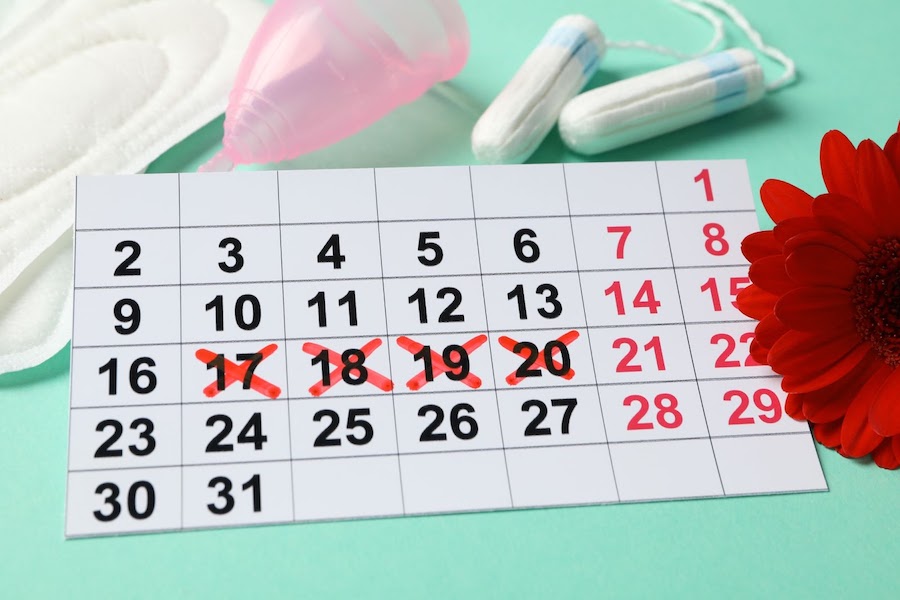Why Am I Spotting Before My Period?
Spotting before period can happen for a variety of reasons. Many of them aren’t anything to stress over. So ladies, take a breath. At ThriVe, we’re here to help you figure out what’s up. Women’s bodies can be complicated, but we’re smart, and capable of learning how they work. We deserve to be informed and confident about our health and bodies!
So, you’ve got some spotting before your period? It’s understandable to feel a bit freaked out about it. Let’s chat about some of the most common causes:
Hormonal Fluctuations
Hormones play a huge role in regulating your menstrual cycle. Sometimes, things like stress and diet changes can throw your hormones off balance. Crazy, right? When this happens, you might notice changes to your cycle.1
– Why does this happen? Your body’s hormone levels control the thickening and shedding of the uterine lining.2 If these hormones fluctuate too much, you might shed a bit of that lining earlier than expected. That can lead to spotting.3

– When to be concerned? If your periods become irregular after being regular, or if you find yourself bleeding a lot between periods, it might be worth getting checked out by your doctor.
Ovulation Spotting
Sometimes, spotting between periods is due to ovulation.
Ovulation spotting happens when your body releases an egg in the middle of your cycle. That’s usually around day 14 if you have a 28-day cycle. Some women experience spotting during ovulation, which is totally normal.
– When to be concerned? Ovulation spotting is usually light (just slight vaginal bleeding or vaginal discharge).4 If the bleeding is heavier or painful, it’s a good idea to talk to your doctor to rule out other causes.
Implantation Bleeding
Have you been sexually active lately? Notice spotting around the time you expect your period? That could be implantation bleeding. Spotting may be one of the earliest signs of pregnancy and happens when a fertilized egg attaches to the lining of your uterus. Learn more about other pregnancy signs (nausea, fatigue, sore breasts) so you know what to look out for.5
– When to be concerned? If you’ve been sexually active and have missed your period, it’s a good idea to take a pregnancy test. ThriVe offers no-cost, lab-quality tests if you need answers. We’ll never judge, and never pressure you into anything. Scheduling an appointment can give you the information you need to start your decision-making process.
Infections or STIs
Bleeding in between periods can sometimes be a sign of a sexually transmitted infection (STI). If you’ve been sexually active, it’s super important to get screened for STIs. Some STIs are easy to cure. Others are more complicated.6 But getting treatment early is key to preventing damage to your health. Are you experiencing other symptoms like pain, burning, or an unusual discharge? Common culprits include pelvic inflammatory disease (PID) or sexually transmitted infections (STIs) like chlamydia or gonorrhea.6, 7
– When to be concerned? If you suspect you might have an infection or STI, it’s super important to get tested. You’re worth it. ThriVe offers no-cost STI screenings to help you figure out what’s going on. Our screenings are discreet, and our team is very supportive. ThriVe is a judgment-free zone. A safe place. Make your appointment soon if you think you could have an STD.
Hormonal Birth Control
For women who take birth control pills (like the hormonal pill, patch, IUD, or shot), spotting can be a common side effect.
– Why does this happen? Birth control works by altering the levels of estrogen and progesterone in your body to prevent ovulation. This change can sometimes cause spotting.8
– When to be concerned? Has your spotting been going on for three months? Is the bleeding heavy? You may want to consult your doctor to see if there are other options for you. ThriVe can also help discuss options if you’re considering delaying sex and want to avoid contraceptives altogether. Delaying sex? What?? Yep, you read that right. If birth control or the risks of pregnancy and STDs is causing you stress, please know, you have options.

The secret to confidence
If you’re not ready for the responsibility of using birth control or dealing with pregnancy and STD risks, delaying sex is an option. Even now. It eliminates the need for hormonal contraceptives and any associated side effects (like spotting) altogether. You’re in control of your body. This is your choice, and yours only. Lots of women are choosing to delay sex for now, to take control of their health and goals.
– Why does this happen? Choosing to delay sex gives you time to fully understand your body, and your options. You’d be freed up to think about what’s right for you before adding in the stress of managing contraception or unplanned pregnancies.
– When to be concerned? There’s no right or wrong time to decide when to be sexually active. You should have all the info and feel confident in your decision. ThriVe can be a great resource for talking through your options and providing emotional support. We’ve got your back, no matter what.
When Should I Seek Medical Attention?
Sometimes, spotting before period is just a part of your cycle. But there are a few instances when you should check in with a healthcare provider:
| Spotting is heavy, painful, or lasts longer than a few days. | You’ve been sexually active and are concerned about an STI. |
| You think you might be pregnant. | You experience unusual symptoms like pain, burning, or itching. |
| You’ve missed a period or have other pregnancy symptoms. |
ThriVe offers no cost services like pregnancy tests, STI screenings, and ultrasounds, so you don’t have to wonder what’s going on with your body. You can get answers in a safe, supportive environment. Our services are done by women, for women.
QUIZ: Why Am I Spotting?
Wondering what’s going on in your body? No prob. Take this quick quiz to help you get a better picture.
1. Are you taking hormonal contraceptive?
– Yes
– No
2. Have you had sex in the past month?
– Yes
– No
3. Could you be pregnant?
– Yes
– No
4. Do you have any unusual symptoms like pain, unusual discharge, burning, or itching?
– Yes
– No
5. Is your period late, or have you missed a period entirely?
– Yes
– No
| Results: | |
|---|---|
| Yes to 1? | Spotting could be related to hormonal contraceptives. |
| Yes to 2 or 3? | You may want to take a pregnancy test or visit ThriVe for a no-cost, lab-quality test. |
| Yes to 4? | An infection or STI could be the cause, and getting tested is super important. |
| Yes to 5? | Pregnancy could be a possibility, or it could be another underlying cause. Consider taking a test or seeing a doctor. |
Remember, ThriVe is here to help with no-cost pregnancy tests, STI testing, and other health services. You don’t have to figure this out on your own—get the support and answers you need!
Sources:
1 https://newsnetwork.mayoclinic.org/discussion/many-possible-causes-of-irregular-periods/
2https://www.mayoclinic.org/healthy-lifestyle/womens-health/in-depth/menstrual-cycle/art-20047186
3 https://www.mayoclinic.org/symptoms/vaginal-bleeding/basics/causes/sym-20050756
4https://www.mayoclinic.org/diseases-conditions/mittelschmerz/symptoms-causes/syc-20375122
7https://www.mayoclinic.org/diseases-conditions/pelvic-inflammatory-disease/symptoms-causes/syc-20352594
8https://www.mayoclinic.org/tests-procedures/combination-birth-control-pills/about/pac-20385282




